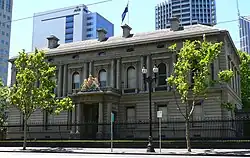The Greek Precinct, Melbourne in Victoria, Australia, is a Greek cultural area centred on the eastern end of Lonsdale Street in the Melbourne city centre.[1] The area runs adjacent to Melbourne Chinatown on Little Bourke Street.
According to the 2016 Australian census, Melbourne has the largest Greek population in Australia with 173,598 Greeks, making up 3.87% of Greater Melbourne's population. Globally, Hellenic identity and values are passed on from one generation to the next and do not depend upon one's location in the world. As such, 88% of Greek Australians (regardless of country of birth) speak Greek and 91% are members of the Greek Orthodox Church.[2]
Australia and Greece have a close bilateral relationship based on historical ties and the rich contribution of Greek Australians to Australian society. In 2019, the export of Australian services to Greece was valued at $92 million, while services imports from Greece totalled $750 million. Australia's stock of investment in Greece in 2019 totalled $481 million. Investment in Australia from Greece was $192 million.[3]
As a result of the extensive historical and cultural ties between the Greek community of Melbourne and their Greek homeland, Melbourne is a sister city to Thessaloniki, Greece's second largest city and cultural centre.[4]
The Precinct
The Greek Precinct is located between Swanston Street and Russell Street, along Lonsdale Street, in the Melbourne city centre. It is home to many Greek restaurants and Greek cultural shops. Located on the corner of Lonsdale Street and Russell Street is the Greek Community Centre of Melbourne,[5] and at 209 Lonsdale Street is the Sam Papasavas Building - the home of the Australia-Greek Learning and Resource Centre of the Royal Melbourne Institute of Technology (RMIT).[6]
Located nearby, on the corner of La Trobe Street and William Street, is the Hellenic Foundation for Culture's centre and the Hellenic Museum of Melbourne.[7] Both the centre and museum are housed in the historic former Melbourne Mint, and is contiguous with the National Centre for Hellenic Studies and Research of La Trobe University.[8]
In March 2009, the Government of Victoria and the City of Melbourne announced that the Greek Precinct would receive a A$3.5 million rejuvenation.[9]
Antipodes Festival
The annual Melbourne Antipodes Festival is held on Lonsdale Street over a week in March, and has been held since 1987. The festival is renowned for its Lonsdale Street "Glendi" (Greek for "party") - a weekend-long event that is held to coincide with the Greek National Day (25 March).[10]
Antipodes brings a weekend of Greek culture, food and entertainment to Melbourne's historic Greek Precinct. The festival features three stages of free entertainment, children's rides and activities and over 60 food, drink and craft stalls. [11]
The annual Greek Film Festival is held in Melbourne over two weeks in September, and has been held since 1990.[12]
Gallery
 Monument to the Melbourne-Thessaloniki sister city relationship
Monument to the Melbourne-Thessaloniki sister city relationship The historic former Melbourne Mint, which now houses a Greek cultural centre and a museum
The historic former Melbourne Mint, which now houses a Greek cultural centre and a museum Fire dancing at the 2009 Lonsdale Street Glendi
Fire dancing at the 2009 Lonsdale Street Glendi
See also
References
- ↑ "Greek precinct". City of Melbourne What's On. Retrieved 15 April 2019.
- ↑ SBS. "Greek Culture - Cultural Atlas". Retrieved 20 January 2022.
- ↑ https://www.dfat.gov.au/geo/greece/greece-country-brief.
{{cite web}}: Missing or empty|title=(help) - ↑ City of Melbourne. "International relations - Thessaloniki". Retrieved 7 August 2009.
- ↑ "Greek Community of Melbourne and Victoria homepage". Retrieved 7 August 2009.
- ↑ Collections Australia Network. "Australian-Greek Resource and Learning Centre, RMIT". Retrieved 7 August 2009.
- ↑ Hellenic Foundation for Culture. "Centres: Melbourne". Retrieved 7 August 2009.
- ↑ La Trobe University. "National Centre for Hellenic Studies and Research". Archived from the original on 8 September 2009. Retrieved 7 August 2009.
- ↑ Office of the Premier of Victoria. "$3.5m boost for Melbourne's Lonsdale Street Greek Precinct". Retrieved 7 August 2009.
- ↑ Melbourne Antipodes Festival. "Lonsdale Street Glendi". Retrieved 7 August 2009.
- ↑ Greek Centre for Contemporary Culture. "Lonsdale Street Greek Festival". Retrieved 3 August 2016.
- ↑ Melbourne Antipodes Festival. "Greek Film Festival". Retrieved 7 August 2009.